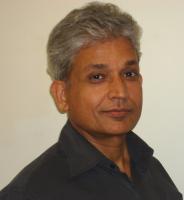|
|
|

Professor Sharad Kumar*
Hanson Institute
Cancer for Cancer Biology SA Pathology
Frome Road, Adelaide 5000
Email: sharad.kumar@health.sa.gov.au
Tel: +61-8-8222-3738
Fax: +61-8-8222-3139
Homepage: http://www.imvs.sa.gov.au/haematology/research/MolReg/MolReg.html
| Research |
The two major interests of our laboratory are: (1) the study of programmed cell death (apoptosis) of normal and cancer cells, with a special focus on caspases, and (2) regulation of protein stability and trafficking by ubiquitination.
Apoptosis plays a fundamental role in cell and tissue homeostasis and its misregulation results in a variety of human diseases including many types of cancer. We are studying the function and regulation of caspases, a group of proteases that act as effectors of apoptosis.
Ubiquitin-mediated protein modification plays an essential role in cellular regulation. Recent studies suggest that ubiquitination is a major regulator of many ion channels, receptors and transporters. We are studying the function of a group of ubiquitin-protein ligating enzymes (Nedd4-like proteins). The Nedd4 family of ubiquitin ligases belongs to the HECT class of E3s. We are using a variety of molecular, cellular and gene knockout approaches to study the physiological functions of these enzymes. We are also studying a group of proteins that regulate the function of the Nedd4 family of E3s. |
|
| Collaborations |
Professor Baoli Yang, University of Iowa
Professor David Cook and Dr Anuwat Dinudom, University of Sydney
Professor Philip Poronnik, RMIT
Professor Seong-Seng Tan, Howard Florey Institute
Professor Eric Baehrecke, University of Massachusetts Medical School |
|
| Publications |
FFotia AB, Ekberg J, Cook DI, Adams DJ, Poronnik P, Kumar S (2004) Regulation of neuronal voltage-gated sodium channels by the ubiquitin-protein ligases Nedd4 and Nedd4-2. J. Biol. Chem. 279: 28930-28935.
Baliga BC, Read SH, Kumar S (2004) The biochemical mechanism of caspase-2 activation. Cell Death Differ. 11: 1234-1241.
Dorstyn L, Mills K, Lazebnik Y, Kumar S (2004) The two cytochrome c species, DC3 and DC4, are not required for caspase activation and apoptosis in Drosophila cells. J. Cell Biol. 167: 405-410.
Daish TJ, Mills K, Kumar S (2004) Drosophila caspase DRONC is required for specific developmental cell death pathways and stress-induced apoptosis. Developmental Cell 7: 909-915.
Kumar S (2007) Caspase function in programmed cell death. Cell Death Differ. 14: 32-43.
Ho LH, Dorstyn L, Lambrusco, L, Read SH, Kumar S (2008) Caspase-2 is required for cell death induced by cytoskeletal disruption. Oncogene 27: 3393-3404.
Foot NJ, Dalton HE, Shearwin-Whyatt LM, Dorstyn L, Tan SS, Yang, B, Kumar S (2008) Regulation of the divalent metal ion transporter DMT1 and iron homeostasis by a ubiquitin-dependent mechanism involving Ndfips and WWP2. Blood 112: 4268-4275.
Cao XR, Lill NL, Boase N, Shi PP, Croucher D, Shan H, Qu J, Sweezer EM, Place T, Kirby PA, Daly RJ, Kumar S*, Yang B* (2008) Nedd4 controls animal growth by regulating IGF-1 signaling. Science Signaling. 1: ra5. (*joint-senior authors)
Ho LH, Taylor R, Cakouros D, Dorstyn L, Bouillet P, Kumar S (2009) A tumor suppressor function for caspase-2. Proc. Natl. Acad. Sci. USA 106: 5336-5341.
Rotin D, Kumar S (2009) Physiological functions of the HECT family of ubiquitin ligases. Nature Rev. Mol. Cell Biol. 10: 398-409. |
|
|
|
|
|
|
|
|